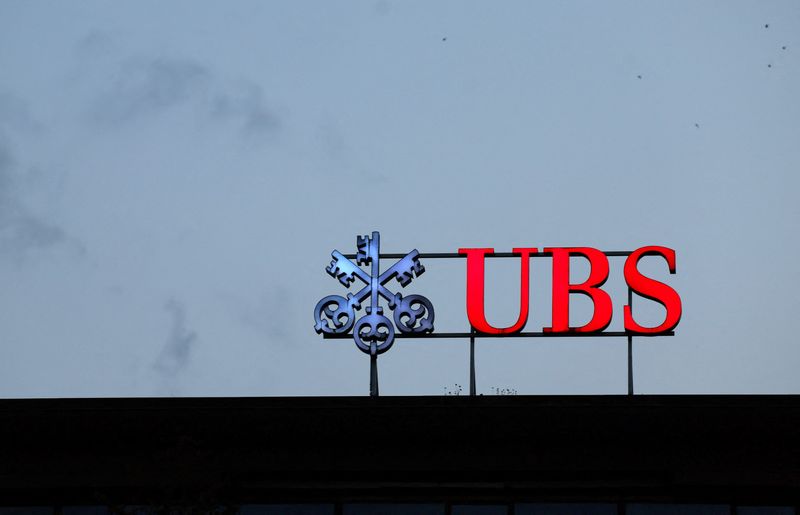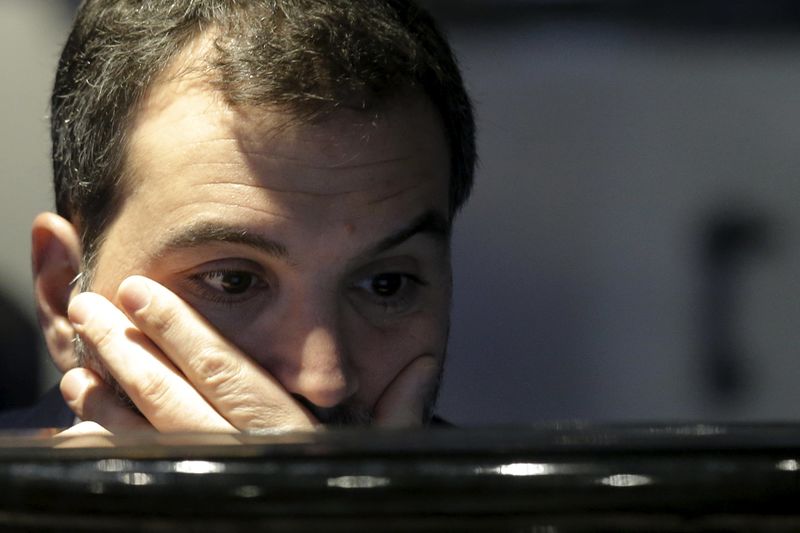By Dave Graham and Tommy Reggiori Wilkes
ZURICH (Reuters) -Swiss bank UBS on Wednesday posted a quarterly profit double the market forecast, boosted by investment banking and bigger-than-expected savings from the integration of its former rival Credit Suisse.
Net profit of $1.1 billion for the April-June period beat the $528 million forecast in a company-provided poll for what were UBS’s first results since its merger with Credit Suisse was formally completed in May.
UBS shares rose 6% at around 2pm GMT, outperforming the European banking sector.
Switzerland’s largest bank said savings from the Credit Suisse integration came faster than expected, although Deutsche Bank analysts said figures at UBS’s Global Wealth Management and Personal and Corporate Banking divisions were below expectations, which somewhat negated the results.
In a statement, UBS CEO Sergio Ermotti said the first half results reflected “significant progress” the bank had made since its acquisition of Credit Suisse, leaving the bank well positioned to meet targets and return to pre-acquisition profitability levels.
“We are now entering the next phase of our integration, which will be critical to realizing further substantial cost, capital, financing and tax benefits,” Ermotti said.
The results varied by division. As seen across peers, investment banking thrived, with underlying revenues in the division up 26% this year to $2.5 billion. Nearly two-thirds of the increase came from America, UBS said. Performance was also robust in the non-core activities and the old division.
UBS said it achieved an additional $0.9 billion in gross cost savings, achieving approximately 45% of its cumulative annual target.
The goal is to achieve $13 billion in savings by the end of 2026, and the bank now expects to achieve $7 billion of that this year, after previously expecting $6.5 billion.
The bank said it has reduced non-core and legacy risk-weighted assets by 42% since the second quarter of last year, including an $8 billion quarter-over-quarter decline.
It also said it had agreed to sell Credit Suisse’s U.S. mortgage servicing business to an undisclosed buyer.
Meanwhile, net inflows of new assets reached $27 billion, even as UBS executives warned the outlook was clouded by geopolitical tensions, the US election race and market volatility.
UBS acquired its longtime rival in March 2023 in a rescue operation mounted by Swiss authorities as Credit Suisse collapsed after a series of setbacks and scandals.
FRAGILITY
“The market environment is quite volatile and there are elements of vulnerability that we are seeing,” Ermotti told analysts.
The bank said it expected about $1.1 billion in integration-related expenses in the third quarter and that the pace of gross cost savings would gradually decline modestly. These expenses should be partially offset by an increase of about $0.6 billion in purchase calculation effects, the report said.
UBS also said that mix shifts in Global Wealth Management and the effects of the Swiss National Bank’s second rate cut, which have not yet been reflected in UBS’s retail and corporate banking deposit prices, will weigh moderately on net interest income .
UBS is taking into account two more rate cuts by the SNB in 2024, CFO Todd Tuckner said.
UBS reported a profit of almost $29 billion in the second quarter of 2023 as a result of a one-time gain from the Credit Suisse acquisition, which is well below its value. That was followed by two consecutive quarters of losses caused by the cost of absorbing its rival.
Investors had boosted the bank’s share price by more than two-thirds this summer since it bought Credit Suisse, although UBS shares lost ground amid recent market turmoil.
Markets are also watching Swiss efforts to tighten banking rules to ensure there is no repeat of the Credit Suisse debacle.
The Swiss government presented a series of proposals in April, outlining how UBS should hold additional capital. UBS has expressed “serious” concerns about the prospect.
Ermotti said he expected to have more clarity on capital requirements by the turn of the year, noting that Switzerland’s introduction of Basel III capital adequacy rules in January 2025 would be a “short-term disadvantage” for UBS.
So far, the Basel III situation seemed manageable, but if other jurisdictions did not fully transition to the rules in the next two years, it would become even more problematic, he said.

If UBS can manage the Credit Suisse integration without major problems, many analysts remain optimistic about the prospects.
“Longer term, we see UBS structurally as the largest asset management player, especially when it comes to ultra-high net worth globally,” JPMorgan analysts wrote.


